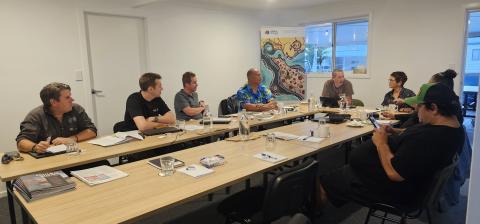


The theme of this year’s Reconciliation Week Bridging Now to Next resonates as Natural Hazards Research Australia (the Centre) embarks on the development of its First Nations Strategy with the inaugural meeting of our First Nations Pathways Working Group.
Generously hosted on Nyangbul Country of the Bundjalung Nation, working group members met together in person and on Country to start building the trust and mutual understanding needed to develop a shared vision of the future and a pathway to get there.
It is hard to overestimate the value and privilege of starting this journey on Country, yarning with each other and community members directly impacted by disasters. This strategy will clearly demonstrate the impact of actively including and empowering Aboriginal and Torres Strait Islander Peoples in emergency and resilience decision-making. Being on Country and hearing the lived experiences of community members grounded this conversation, which can become abstract, into a vision for tangible impact in the community.
The meeting place happened to be the initial evacuation location of the Cabbage Tree Island Community during the 2022 floods. Three years on, the community still hasn’t been allowed to return and Kylie Jacky, who has kindly agreed to join the working group, shared some of the impacts this displacement has and continue to have on her community. We were also lucky enough to be joined by Centre Board member, Oliver Costello’s colleagues at Jagun Alliance, including Keith Close, Kyle Slabb and Uncle Marcus Ferguson. I would like to extend a huge thanks to all three for their generosity and time.
Personally, it was great to finally meet Uncle Marcus, who made the message sticks which have been a key part of the Centre’s journey in support of reconciliation, with one for each Centre node. He made these to mark the beginning of the Centre’s Reflect Reconciliation Action Plan (RAP) which concluded in December 2023.
I previously reflected on becoming the RAP working group Chair around the time of the Voice Referendum. This was also a period of time when the group’s membership changed, as members took time to reflect on what reconciliation meant for them. This time for reflection ultimately led to the decision to establish this group. We aimed to articulate our vision clearly and create an impactful initiative aligned with First Nations’ goals. As a result, the Pathways Working Group was formed to support this mission.
I feel incredibly lucky to now be at the start of this new chapter and begin in the way we did. I extend a huge thanks to our Pathways working group members below for putting up their hands up to support us in this - thank you all for all your engagement and generosity in sharing your experience and wisdom over the two days. It is such a great group and I really look forward to making this journey together.
The First Nations Pathways working group comprises:
